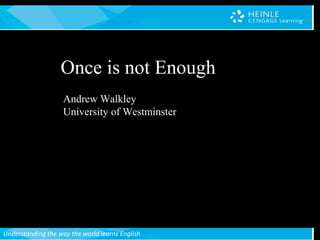Once Is Not Enough 3
- 1. Understanding the way the world learns English Andrew Walkley University of Westminster Once is not Enough
- 2. Understanding the way the world learns English What did you teach in your last lesson? Say five words / expressions you taught recently. Explain why / how you taught them.
- 3. Understanding the way the world learns English Initial practice is only a stating point Need repeated comprehensible exposure over time Rote-learning can help but not just words Need to remember common things (Eu-en) T-S interaction Lazy or just short of time?
- 4. Understanding the way the world learns English • strike (n) • to be on strike • The train drivers are on strike at the moment so I had to take the bus. They want more money. • They’ve reached an agreement. They’re going back to work on Monday. • Call a strike / vote to strike / go on strike / be on strike / bring an end to the strike
- 5. Understanding the way the world learns English Why do people go on strike? What happens when train drivers go on strike? Why would you need a mop and bucket? Where do you keep a mop and bucket? Say three things that can leak? What do you do if a pipe is leaking?
- 6. Understanding the way the world learns English
- 7. Understanding the way the world learns English Vocabulary Builder
- 8. Understanding the way the world learns English
- 9. Understanding the way the world learns English
- 10. Understanding the way the world learns English
- 11. Understanding the way the world learns English Keep an eye on record books Talk to Ss and discuss the way they learn. Use the board to show good practice (collocations / expressions / translations) Learner Training
- 12. Understanding the way the world learns English Choose 3/5 expressions Quizes (check and expand) Memorize and test (rote-learning) Translate and test Act or draw Team games Revisiting tasks / texts Re-grouping / making connections.
- 13. Understanding the way the world learns English Follow us on facebook Hugh Dellar and Andrew Walkley Contact details
- 14. Understanding the way the world learns English REAL ENGLISH FOR THE REAL WORLD













